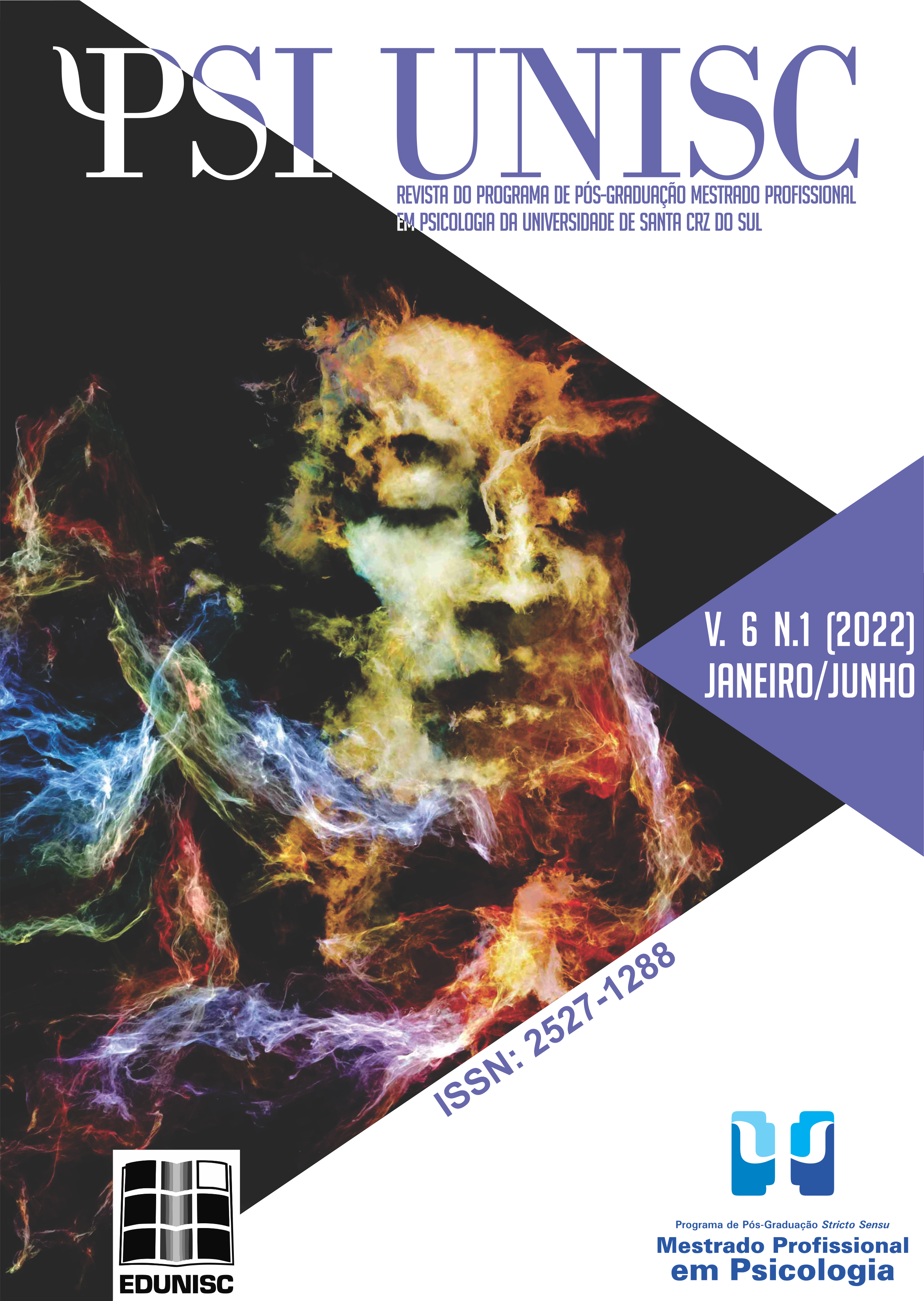Modernization, social and psychosocial risks
DOI:
https://doi.org/10.17058/psiunisc.v6i1.16460Keywords:
Social risks, Psychosocial risks, Self Expression Values, GriefAbstract
The modernization process experienced, mainly in the last two decades of the last century and in the initial decades of the 21st century, presents some social and psychosocial risks that are phenomena resulting from this process. There are attempts to minimize them in different ways, but not all coun-tries have managed to effectively minimize the pre-modern risks, called “visible” and the “invisible” risks that are closely linked to the development of technology generating challenges. There are views on contemporary cultural patterns that point in different directions: either of self-expression values, or of a feeling of mourning. The objective of the present study is to identify whether there are effects on the values of self-expression and the feeling of mourning as cultural developments to contempo-rary modernization, which are not opposites, but complementary. To this end, a theoretical review and empirical testing were carried out on the relationship between social and psychosocial risks - based on the work of Beck (2010) - and the feeling of mourning - identified in the work of Zizek (2010) -, and a quantitative analysis based on data from the seventh round (2017/2020) of the World Values Survey, for the empirical testing of self-expression and survival values identified by Inglehart and Wezel (2009). The hypothesis is that such values, of self-expression and survival, culturally mate-rialize the dichotomy between risks and grief, especially in a changing world and that there is great oscillation between optimistic and pessimistic perspectives on the effects of modernization. The world has been going through profound technological, economic and social changes that can be measured quantitatively, in indices and indicators of human and social development, but also in the formation of values. The modernization of the last few centuries has brought relief to vast sections of the population, but it has also brought hopelessness and fear. Fear has already been related to survival values, but it can also be, as a feeling of mourning, related to the values of self-expression, a kind of fatigue that people are having with all this appeal for happiness, self-help, security and comfort.
Downloads
References
Beck, U. (2010). Sociedade de risco: rumo a uma outra modernidade. São Paulo: Ed. 34.
Bendassolli, P., & Borges-Andrade, J. E. (2011). Significado do trabalho nas indústrias criativas. Revista de Administração de Empresas, 51(2), 143159.
Cardoso, F. H., & Faletto, E. (1984). Dependência e desenvolvimento na América Latina: ensaio de interpretação sociológica. Rio de Janeiro: Zahar Editores.
Cheung, S. Y. (2019). Lessons from an “old” second generation in the US: fresh evidence on assimilation theories. Ethnic and Racial Studies, 42(13), 2285-2290. doi: 10.1080/01419870.2019.1627477
Ciftci, S. (2018). Self-expression values, loyalty generation, and support for authoritarianism: evidence from the Arab world. Democratization, 25(7), 1132-1152. doi: 10.1080/13510347.2018.1450388
Dejours, C. (2006). O medo e a precarização do Trabalho. Sociedade do Risco. Entrevista conce-dida a IHU Online. Recuperado de http://www.ihuonline.unisinos.br/media/pdf/IHUOnlineEdicao181.pdf
Diener, E., Oishi, S. & Lucas R. E. (2002). Subjetive well-being: The science of happiness and life satisfaction. In C. R. Snyder, & S. Lopes (Eds.), Handbook of Positive Psychology (pp. 187-194). New York: Oxford University Press.
Freud, S. (2010). Luto e melancolia (Obras Completas de Sigmund Freud, vol.XII). São Paulo: Companhia das Letras (Original publicado em 1917).
Giddens, A. (1994). A vida em uma sociedade pós tradicional. In U. Beck, A. Giddens & S. Lash (Orgs.), Modernização reflexiva: política, tradição e estética na ordem social moderna. São Paulo: EdUnesp.
Giddens, A. (2002). Modernidade e identidade. Rio de Janeiro: Jorge Zahar.
Harari, Y. (2015). Homo Deus: uma breve história do amanhã. São Paulo: Companhia das Letras.
Han, B. (2019). Hiperculturalidade: cultura e globalização. Petrópolis, RJ: Vozes.
Han, B. (2015). A sociedade do cansaço. Petrópolis, RJ: Vozes.
Holum, M. L. (2018). How does competitive tendering and contracting affect satisfaction with mu-nicipal health and care services?. International Review of Administrative Sciences, 84(3) 520–538, doi: 10.1177%2F0020852316630391
Inglehart, R., & Welzel, C. (2009). Modernização, mudança cultural e democracia: a sequência do desenvolvimento humano. Brasília: Verbena.
Inglehart, R., Haerpfer, C., Moreno, A., Welzel, C., Kizilova, K., Diez-Medrano J. ... B. Puranen (eds.). (2020). World Values Survey: All Rounds – Country-Pooled Datafile. Madrid, Spain & Vienna, Austria: JD Systems Institute & WVSA Secretariat. Recuperado de http://www.worldvaluessurvey.org/WVSD ocumentationWVL.jsp
Kapitány-Fövény, M., Richman, M. J., Demetrovics, Z., & Sulyok, M. (2018). Do you let me symptomatize? The potential role of cultural val-ues in cross-national variability of mental disorders’ prevalence. International Journal of Social Psychiatry, 64(8) 756–766, doi: 10.1177%2F0020764018811361
Krys, K., Uchida, Y., Oishi, S., & Diener, E. (2018): Open society fosters satisfaction: explanation to why individualism associates with country level measures of satisfaction. The Journal of Positive Psychology, 14(6), 768-778. doi: 10.1080/17439760.2018.1557243
Kübler-Ross, E. (2009). Sobre a morte e morrer (9 ed.). São Paulo: Martins Fontes.
Levitsky, S., & Ziblatt, D. (2018). Como as democracias morrem. Rio de Janeiro: Zahar.
Lhuilier, D. (2020). E se essa crise mudasse radicalmente o mundo do trabalho. Caderno de Administração, 28, 89-94. doi: 10.4025/cadadm.v28i0.53900
Lipovetsky, G., & Serroy, J. (2011). Culturamundo: resposta a uma sociedade desorientada. São Paulo: Companhia das Letras.
Lourenço, N. (2019). Sociedade Global, Risco e Segurança. Revista de Estudos Constitucionais, Hermenêutica e Teoria do Direito (RECHTD) 11(2), 211-219. doi: 10.4013/rechtd.2019.112.05
Lövgren, J. (2018). Secular youth and religious practice: candle lighting in Norwegian folk high schools. British Journal of Religious Education, 40(2), 124–135. doi: 10.1080/01416200.2016.1256268
Malvezzi, S. (2013). A gestão de pessoas no contexto da estrutura de redes: desafios para a sociedade, empresas e indivíduos. Perspectivas em Gestão & Conhecimento, 3(3), 6-17.
Marini, R. M. (1992). América Latina: dependência e integração. São Paulo: Editora Brasil Urgente.
Martins, C. E. (2011). Globalização, dependência e neoliberalismo na América Latina. São Paulo: Boitempo.
Meireles, M. I. P. (2012). Entre a Submissão e a Revolta: Estudo Exploratório sobre o Medo Social do Desemprego nas Indústrias do Vestuário e Calçado (Dissertação de Mestrado). Departamento de Sociologia, Instituto Universitário de Lisboa, Portugal. Recuperado de http://hdl.handle.net/10071/6159
Nasciutti. J. C. R. (2020). Pandemia e perspectivas no mundo do trabalho. Caderno de Administração, 28(Ed. Esp.).
Noll, J., Rohmann A., & Saraglou, V. (2018). Societal level of religiosity and religious identity expression in Europe. Journal of Cross-Cultural Psychology, 49(6), 959975, doi: 10.1177%2F0022022117737302
Piketty, T. (2020). Capital e ideologia. Rio de Janeiro: Intrínseca.
Piketty, T. (2013). Le capital au XXIe siècle. Paris: Seuil.
Pires, S. C., Pinto, A. L., & Justo, A. M. (2021) Percepção de risco da violência urbana no estado do Espírito Santo. PSI UNISC, 5(1), 96-110. doi: 10.17058/psiunisc.v5i1.15335
Rawls, J. (2011). O Liberalismo político (Trad. Luís Carlos Borges). São Paulo: Editora WMF Martins Fontes.
Roudijk, B., Donders, A. R. T., & Stalmeier, P. F. M. (2019). Cultural values: can they explain differences in health utilities between countries?. Medical Decision Making, 39(5), 605–616. doi: 10.1177%2F0272989X19841587
Rudnev, M., & Savelkaeva, A. (2018). Public support for the right to euthanasia: Impact of traditional religiosity and autonomy values across 37 nations. International Journal of Comparative Sociolo-gy, 59(4), 301–318.
Salvagni, J. E., & Veronese, M. V. (2017). Risco invisível: trabalho e subjetividade no setor elétrico. Psicol. soc. (Online), 29, e131134.
Schihalejev, O. Kuusisto, A. Vikdahl, L. & Kallioniemi, A. (2019). Religion and children’s percep-tions of bullying in multicultural schools in Estonia, Finland and Sweden. Journal of Beliefs & Values, 41(3), 371-384. doi: 10.1080/13617672.2019.1686732
Slovic, P. (1987). Perception of Risk. Science, 236(4799), 280-285. doi: 10.1126/science.3563507
Spink, M. J. (2001). Trópicos do discurso sobre o risco: Risco- aventura como metáfora na modernidade tardia. Cadernos de Saúde Pública, 17, 1277-1311.
Teti, A., Abbott, P., & Cavatorta, F. (2019). Beyond elections: perceptions of democracy in four Arab countries. Democratization, 26(4), 645-665, doi: 10.1080/13510347.2019.1566903
Yoo, Y., Boland, R. J., Lyytinen, K. & Majchrzak, A. (2012). Organizing for Innovation in the Digitized World. Organization Science, 23(5), 1398-1408. Recuperado de https://EconPapers.repec.org/RePEc:inm:ororsc:v:23:y:2012:i:5:p:1398-1408.
Van Horn. J. E., Taris, T. W., Schaufeli, W. B. & Scheurs, P. J. G. (2004). The structure of occu-pational well-being: a study among Dutch teachers. Journal of Occupational and Organizational Psychology, 77, 365375.
Vial, G. (2019). Understanding digital transformation: A review and a research agenda. The Journal of Strategic Information Systems, 28(2), 118-144.
Zafar, R. (2019). Impact of income and education on socio-political values of women: an empirical study of Pakistani working women. Journal of Asian and African Studies, 54(5), 691-701. doi: 10.1177%2F0021909619830718
Zizek, S. (2010). Viver no fim dos tempos. Lisboa: Relógio D’Água.
Zizek, S. (2015). Problemas no paraíso: do fim da história ao fim do capitalismo. Rio de Janeiro: Zahar.
Zizek, S. (2019). A coragem da desesperança: crônicas de um ano em que agimos perigosamente. Rio de Janeiro: Zahar.
Zhuravlev, D. (2017). Orthodox identity as traditionalism: construction of political meaning in the current public discourse of the Russian Orthodox Church. Russian Politics & Law, 55(4-5), 354-375.
Downloads
Published
How to Cite
Issue
Section
License
The submission of originals to this journal implies the transfer, by the authors, of the printed and digital publication rights. The copyrights for the published articles are those of the author, with periodical rights on the first publication. Authors may only use the same results in other publications clearly indicating this journal as the medium of the original publication. Because we are an open access journal, we allow free use of articles in educational and scientific applications provided the source is cited under the Creative Commons CC-BY license.




